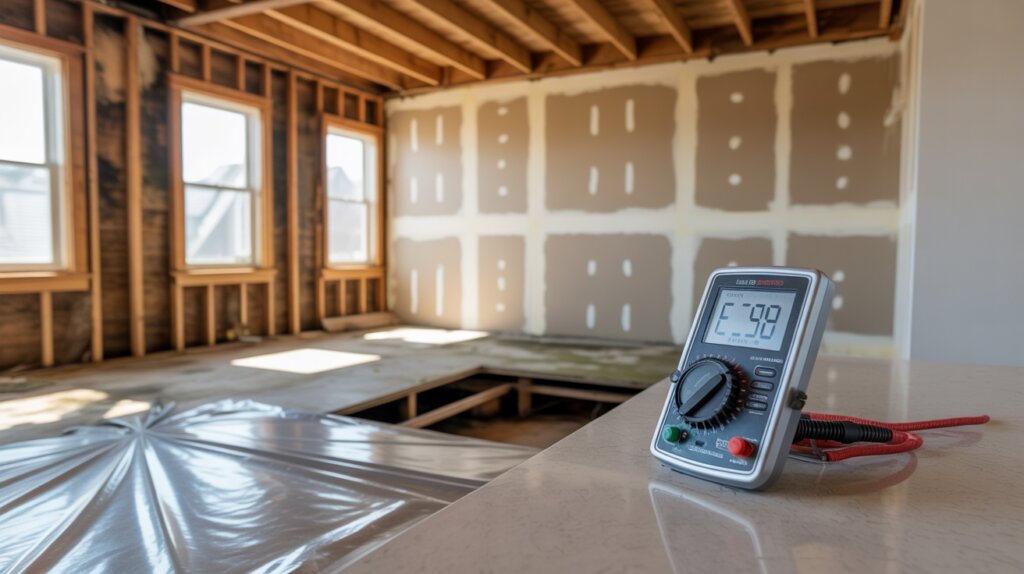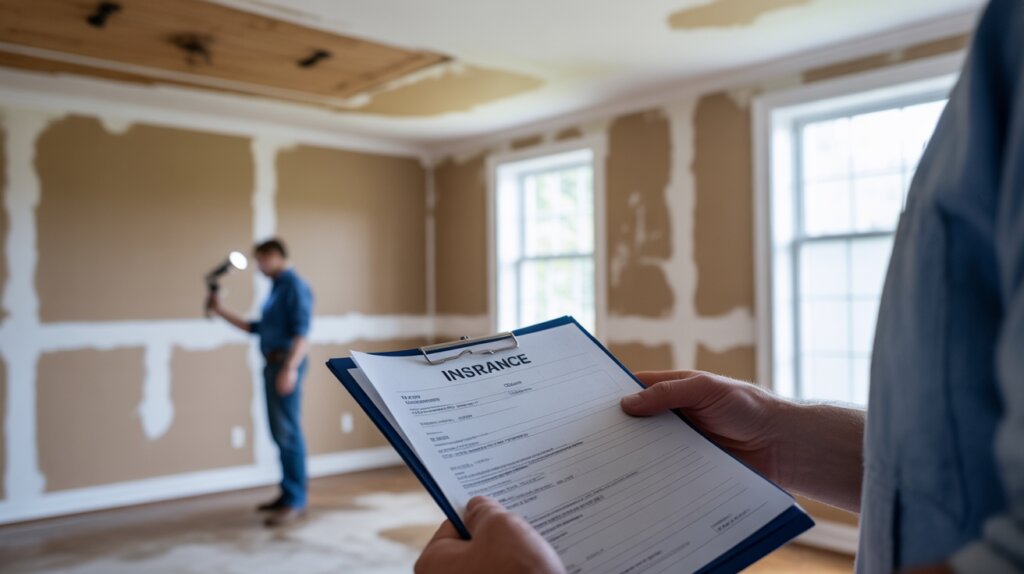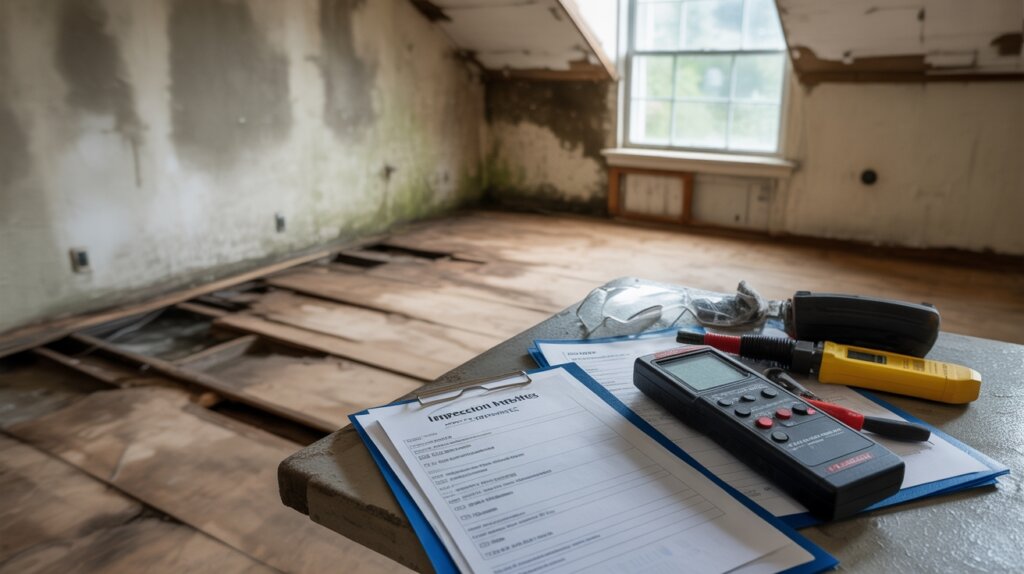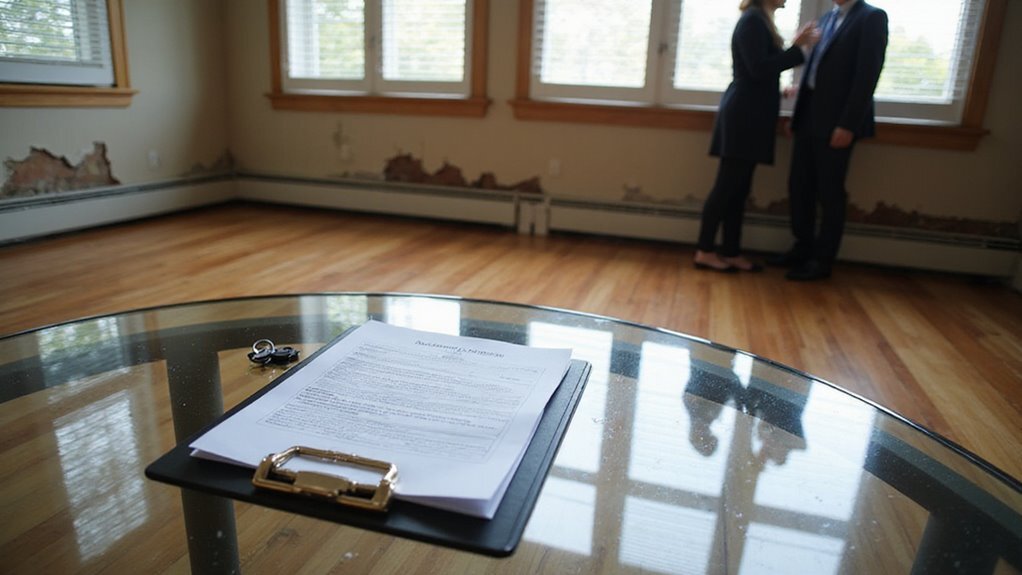Selling a home with water damage can be stressful and confusing. Many sellers hope their home insurance will take care of the repairs. However, insurance coverage is not always guaranteed when you find water damage during the selling process.
The problem gets worse if you do not understand what your policy covers. Insurers can deny claims if the damage is old, gradual, or not reported quickly. This uncertainty can delay your sale or lead to unexpected costs.
Home insurance usually covers sudden and accidental water damage, but not long-term or neglected issues. To avoid surprises, check your policy and talk to your insurer before listing your home.
Proper documentation and fast action are essential for a smooth insurance claim. This blog will guide you through insurance coverage for water-damaged homes and help you avoid costly mistakes.
Key Takeaways
- Home insurance typically covers sudden, accidental water damage events, such as burst pipes or appliance leaks, but excludes damage from neglect or maintenance issues.
- Standard policies do not cover flood damage; separate flood insurance is required for water damage from flooding.
- Mold removal may be covered if it results from a covered water event and is claimed promptly, subject to policy limits and exclusions.
- Insurance may pay for emergency repairs like water extraction and basic cleanup if the water source and event are covered by the policy.
- Proper documentation—photos, repair estimates, receipts, and communication records—is essential for filing and managing water damage claims during a home sale.
Understanding Water Damage and Home Insurance

Home insurance usually covers sudden water damage, but not all types. It does not cover damage from neglect or poor maintenance. Flood damage is not included in standard policies. Having a clear title can help ensure that all property-related issues, including water damage claims, are properly documented and settled before sale.
If you live in a flood zone, you need separate flood insurance. Mold removal may be covered if it is caused by a covered event. Mold from long-term leaks or bad ventilation is usually not covered.
Check your policy’s details to know what is included and what is not. Pay close attention to any exclusions or limits. Understanding your coverage helps you avoid costly surprises later.
Common Causes of Water Damage in Homes
Water damage in homes often comes from a few common sources. Leaking pipes, broken water heaters, and faulty dishwashers are typical causes. Roof leaks can also let water in, especially if gutters are clogged or shingles are damaged. Water intrusion from cracks or openings in the foundation can also contribute to internal water issues, especially in homes with foundation problems.
Basement seepage may happen when drainage is poor or there are cracks in the foundation. If your area gets heavy rain, floods can be a serious risk. Early detection of these issues can help prevent bigger problems. If your home has hidden mold, it can also contribute to water damage issues and should be inspected thoroughly. If you notice any drips or wet spots, act quickly to fix them. Regular checks of plumbing, roofs, and basements are important. Taking these steps can lower the chance of costly repairs later.
Types of Water Damage Typically Covered by Insurance

Home insurance usually covers water damage caused by sudden and accidental events. It does not cover problems from poor maintenance or regular wear. You should know what water damage your policy includes.
Most policies pay for repairs if a pipe bursts without warning. They also cover sudden leaks from appliances like dishwashers or washing machines. If a storm causes your roof to leak, insurance may help pay for repairs. Understanding common causes of water damage can help you prevent future issues and ensure your coverage is adequate.
Mold removal is sometimes covered if it comes from a covered water event. You must check your policy for any limits or exclusions. Always read your insurance documents to understand what is protected. Being aware of coverage limits is essential to avoid surprises when filing claims.
Water Damage Scenarios Often Excluded From Policies
Home insurance often does not cover certain types of water damage. Policies usually exclude damage caused by slow leaks or poor maintenance. If water seeps in over time, insurance may deny your claim. Addressing water issues promptly can prevent further damage and potential claim denials.
Proper Moisture control measures are essential to reduce the risk of damage that might not be covered by your policy. Additionally, understanding the specifics of your water damage coverage can help you better prepare for unexpected issues.
Assessing the Extent of Water Damage Before Selling

Before listing your property, you need to identify hidden moisture issues that aren’t always visible on the surface. Evaluate any risks to structural integrity, focusing on affected walls, floors, and support systems. Document all damage thoroughly to ensure accurate disclosure and protect yourself during the sales process.
Additionally, inspecting for liens and debts related to the property can help clarify any financial encumbrances that might influence the sale. Conducting a thorough assessment of home repairs and potential upgrades ensures you are prepared for negotiations and necessary improvements.
Identifying Hidden Moisture Issues
Hidden moisture can cause serious problems when selling a home. You must find all hidden water issues before listing your house. Surface checks alone may miss damage that leads to costly disputes later.
Moisture meters help you check walls, floors, and ceilings for trapped water. Thermal imaging cameras can show cold spots where water hides behind surfaces. Unexplained odors, stains, or warped areas may also signal hidden moisture.
If you are unsure, consider hiring a professional inspector. Experts can detect moisture problems that are not easy to see. Finding and fixing these issues protects your investment and helps your sale go smoothly.
Evaluating Structural Integrity Risks
Even small water damage can put your home’s structure at risk. It can also lower the value of your home. You should check for hidden problems, not just visible ones.
Stains or warped floors might mean there is damage under the surface. New paint or flooring could cover up mold, rot, or termites. Crawl spaces, basements, and attics often show early signs of damage.
A professional inspection can help find serious issues. If you notice poor drainage or sloping soil, water might reach your foundation. Fix grading or gutter problems to stop further harm.
A complete check is important before selling a home with water damage. If you skip this step, you might miss costly problems. Always address any concerns before listing your property.
Documenting Damage for Disclosure
Documenting water damage is important when selling your home. Buyers and insurers need clear records to understand the property’s condition. If your home is in a flood zone, this information is even more important.
Take photos and videos of any water damage on walls, floors, or ceilings. A professional mold inspection can confirm if there is any contamination. Always keep the inspector’s written report.
Save all repair invoices and contractor assessments for completed work. Insurance claim documents should also be included in your records. These papers show buyers what repairs have been made.
Map your home’s location in relation to local flood zones. This helps buyers understand the risk of future water problems. Good documentation protects you and increases buyer trust.
How to File a Water Damage Claim With Your Insurer
To file a water damage claim, contact your insurance company as soon as you find the problem. Give a clear description of what happened and how much damage there is. If your home is in a flood zone, mention this because it may affect your coverage. Prompt reporting can also help start the claims process more efficiently.
Check your insurance policy to see if it covers this type of water damage. Most standard policies do not include damage from floods. If you are unsure, ask your insurer for details about your coverage. The insurer will tell you what paperwork or forms to fill out next.
Acting quickly helps your claim get processed faster. Fast action also reduces the chance of delays in repairs or selling your home. Being aware of coverage limitations can help you better understand what to expect from your insurer.
Documentation Needed for Water Damage Claims
To file a water damage claim, you need to provide proper documentation. Insurers need proof to confirm your loss matches your policy. Gather the right records before you submit your claim.
Take clear photos and videos of all damaged areas. Photos should show both the damage and its source. If possible, make sure each photo is timestamped.
Get written repair estimates from licensed contractors. Each estimate should detail the repairs needed and their costs. If you skip this, your claim may be delayed.
Save all receipts for emergency repairs or replacements. Keep invoices for any services or items you buy because of the damage. These documents show your expenses.
Keep records of all communication with your insurer and contractors. Written correspondence helps explain what steps you took and when. If you stay organized, your claim will go more smoothly.
Additionally, documenting any damage mitigation efforts you undertake can support your claim and demonstrate your proactive approach to minimizing further damage. Properly managing property safety protocols can also help prevent additional issues and strengthen your case.
Impact of Water Damage Claims on Home Value
When you file a water damage claim, you’re typically required to disclose it to potential buyers, which can affect your home’s perceived value. Appraisers may factor in the history of water damage, potentially lowering your property’s appraisal even if repairs are complete. Buyers often use this information as influence to negotiate a lower purchase price or request additional assurances. Additionally, a damaged home might be more vulnerable to future issues, further impacting buyer confidence and home valuation.
Disclosure Requirements for Sellers
Sellers must tell buyers about any past water damage to the home. Most states require you to share this information by law. Buyers need to know about repairs and water issues before making a decision.
You must share the type of water damage and when it happened. Include which parts of the home were affected. If you fixed any mold or removed water, you should describe these steps.
If the home is in a flood zone, you must say so. You should also tell about any insurance claims for water problems. These facts help buyers understand possible future risks.
Effect on Appraisal Value
Water damage often lowers a home’s value during an appraisal. Appraisers check for water damage history and look at the home’s location. If a home is in a flood zone, it may be worth less.
Appraisers also review any insurance claims for water damage. They check if repairs were done well and if mold was removed by professionals. Poor or incomplete repairs can lead to a lower value.
If there is still moisture or mold, the value may drop more. These problems can harm the home’s structure and make it unsafe. Homes with repeated claims may be seen as risky.
Good repairs and proof of professional work can help protect your home’s value. If you fix issues quickly and properly, the impact may be less. Keeping records of repairs is important for a better appraisal.
Buyer Negotiation Leverage
Appraisers’ findings on water damage give buyers more power during negotiations. Water damage claims can make your home less appealing and lower its value. Buyers may use these issues to ask for a lower price or extra benefits.
A home with water damage history is harder to sell. If the property is in a flood zone, buyers know insurance costs will rise. Buyers may then request even more concessions.
Some buyers might ask for price cuts to cover future repairs. They may also want proof that any mold has been fully removed. If you have not fixed the problems, buyers can insist you do so before closing.
Knowing these points helps you prepare for buyer demands. If you address water damage concerns early, you can protect your position. Otherwise, buyers will likely push for better terms.
Insurance Coverage for Emergency Repairs
Home insurance usually pays for emergency repairs after water damage. Coverage depends on your specific policy and the cause of the water. If you live in a flood zone without flood insurance, standard policies may not help.
Insurance often covers urgent actions like water removal and basic mold cleanup. Insurers also pay for quick repairs to prevent more damage, but only if the water source is covered. Always check if the damage came from a covered event.
You should document all damage and keep every receipt. Promptly tell your insurer about the situation. If you delay, coverage limits might apply.
| Emergency Repair | Insurance Coverage | Key Considerations |
|---|---|---|
| Water Extraction | Usually covered | Water source must be covered |
| Mold Remediation | Sometimes limited | Act fast and keep records |
| Structural Drying | Covered if sudden event | Some events not covered |
| Temporary Repairs | Often reimbursed | Save all receipts |
Additionally, understanding the coverage limits of your policy can help you plan for potential out-of-pocket expenses if damages exceed coverage.
Liability Protection During the Home Sale Process
Liability protection is very important when selling a home with water damage. Homeowners insurance should protect you if someone gets hurt or sick on your property. This is needed until the sale is complete.
If your house is in a flood zone, you may face more liability risks. Water damage can make injuries or illnesses more likely. Your insurance should stay active through the entire sale process.
If mold removal was not done completely, visitors could get sick. They might make claims for health problems caused by mold. Insurance helps protect you in these situations.
Open houses bring more people to your property. Increased visitors mean a higher chance of accidents or injuries. Liability insurance helps shield you from these risks.
Disclosing Water Damage to Potential Buyers
You must tell buyers about any water damage when selling a home. The law requires this and it builds trust with buyers. If you hide damage, you could face legal trouble.
Explain where the water damage happened and how bad it is. List any repairs you made and if problems could return. Buyers need to know how water issues might harm home surfaces or the yard.
Use the table below to show what areas have damage and what buyers can see:
| Area Affected | Visible Impact |
|---|---|
| Living Room | Stained drywall, odor |
| Basement | Mold, damp flooring |
| Attic | Warped beams |
| Yard | Erosion, soggy patches |
| Kitchen | Damaged cabinetry |
Negotiating With Buyers After Water Damage
You should address buyer concerns directly after water damage is discovered. Buyers often worry about hidden problems and future repairs. A clear plan can help protect your interests during negotiations.
If you have documentation, share all records of the water damage and repairs. This includes insurance claims and inspection reports. You should also disclose if the home is in a flood zone or needed mold remediation.
Adjust your asking price if repairs were costly or if buyers face extra risks. Offering a price reduction can help close the deal. If buyers are still unsure, consider offering incentives like a warranty or paying some closing costs.
If you remain open and honest, buyers may feel more confident. Clear communication can help you move forward with the sale.
Repair vs. As-Is Sale: Insurance Considerations
You need to weigh the benefits of filing an insurance claim for repairs before listing against the risks of selling your home as-is with existing water damage. If you opt to repair, your policy may cover restoration costs, but this process can affect timelines and future premiums. Selling as-is might speed up the transaction, yet you’ll likely face lower offers and must disclose the damage’s extent to buyers.
Claiming Repairs Before Listing
You should decide whether to claim repairs before listing your home. Insurance can cover some water damage if you follow the right steps. If you act carefully, you may protect your home’s value.
First, check your insurance policy to see if it covers water or mold damage. If the home is in a flood zone, special rules might apply. Knowing your coverage helps you plan your next steps.
Always take clear photos and notes of the damage. Insurance companies need proof before they pay for repairs. Good records make the claims process smoother.
Get written approval from your insurer before you start any repairs. Without approval, you might not get reimbursed. Following their process is important for your claim.
If you fix the home with professional repairs, buyers often pay more. Mold remediation is especially valued by buyers. Selling as-is usually means lower offers.
Using your insurance wisely can help increase your home’s selling price. Strategic repairs make your property more appealing to buyers. Consider your options before listing your home.
Selling With Existing Damage
Selling with existing damage means you can sell your home without making repairs. You will likely get a lower offer, but the sale is usually faster. Buyers know they are responsible for fixing the damage.
If you decide to repair the water damage, your insurance might help cover the costs. Repairs can make your home more attractive and increase its value. However, fixing damage often takes time and money.
As a landlord, you must share any known issues with buyers. You are also responsible for making sure the home is safe and follows local rules. Future insurance claims will not cover old damage, so buyers will consider this in their offer.
Think about your goals before making a decision. If you want a fast sale, selling as-is may be best. If you want more money, consider making repairs first.
Steps to Take if Your Insurance Claim Is Denied
If your home insurance claim for water damage is denied, you should act quickly and carefully. Insurance companies often exclude certain damages, such as floods or untreated mold. You can protect your finances by following clear steps.
First, request a detailed reason for the denial from your insurer. The denial letter should explain what caused the refusal. If you need more information, ask your insurer to clarify.
Next, gather all documents related to your claim. This can include photos, receipts, repair estimates, and any communication with your insurer. Good records can help if you challenge the decision.
If you believe the denial is unfair, consult an expert. A public adjuster or a lawyer can review your case and offer advice. Their experience can help you understand your options.
Finally, consider filing an appeal with your insurer. Include any new or supporting evidence with your appeal. Acting quickly can help you get the best result.
Conclusion
If you plan to sell a water-damaged house, understanding your home insurance is essential. If you know what your policy covers, you can avoid unexpected costs. If you document damages and disclose them, you will build trust with buyers.
If your insurance claim is denied, you should consider appealing the decision. If you remain proactive and transparent, you can protect your interests and help make the sale process smoother. If you need a fast solution, we buy houses for cash, no matter their condition.
If you want to sell quickly, OC Real Estate is ready to help. If you contact us today, we can give you a fair cash offer. We are here to make your home sale simple and stress-free.

